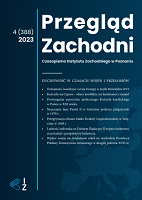Tożsamość, kondycja i wizja Europy w myśli papieża Benedykta XVI
The identity, condition and vision of Europe in the thought of Pope Benedict XVI
Author(s): Mikołaj Tomaszyk, Bartłomiej SeclerSubject(s): Christian Theology and Religion, History of Church(es), Other Christian Denominations, Sociology of Religion, Identity of Collectives
Published by: Instytut Zachodni im. Zygmunta Wojciechowskiego
Keywords: Benedict XVI; pope; Catholic Church; Europe’s identity; religion; Catholicism;
Summary/Abstract: The thought of Benedict XVI has been the subject of scholarly inquiry by representatives of various scientific disciplines, including theologians, anthropologists, historians, sociologists and political scientists. The multidimensional and multifaceted legacy of the late Pope Emeritus, who died on December 31, 2022, cannot be encompassed within the scope of a single discipline alone. This is the case, among others, with Benedict XVI’s reflections on Europe. Significantly, the issues addressed by the Pope in his teaching, speeches, lectures, books and interviews, form a coherent, cohesive agenda for Europe, stemming from a comprehensive study of its condition, whether theological, social, economic or political. The death of John Paul II’s successor afforded an opportunity to undertake research on the issues of contemporary Europe, as perceived by Benedict XVI. Because of the aforementioned range of concerns addressed by him, the authors of this publication were obliged to narrow down their focus to a few crucial topics. These have been translated into the title of the publication as well as the structure of the text. The aim of the article is therefore to analyze the thought of Benedict XVI through the lens of three criteria: identity, condition and vision of Europe. In this regard, it should be emphasized that, contrary to appearances, interpreting Benedict XVI’s Europe is not an easy process. For it demands a better understanding of the views of Benedict XVI prior to the events of 2005, namely the election of Cardinal Ratzinger as Pope. Thus, the authors assume that Benedict XVI’s thought on Europe evolved over time, beginning with the future pope’s university studies. Furthermore, it is also worth noting that Benedict’s Europe correlates to the diagnosis of the problems of the Old Continent that John Paul II spoke and wrote about for twenty-seven years of his pontificate. The source base included archival documents, memorials and studies.
Journal: Przegląd Zachodni
- Issue Year: 388/2023
- Issue No: 4
- Page Range: 7-35
- Page Count: 29
- Language: Polish

